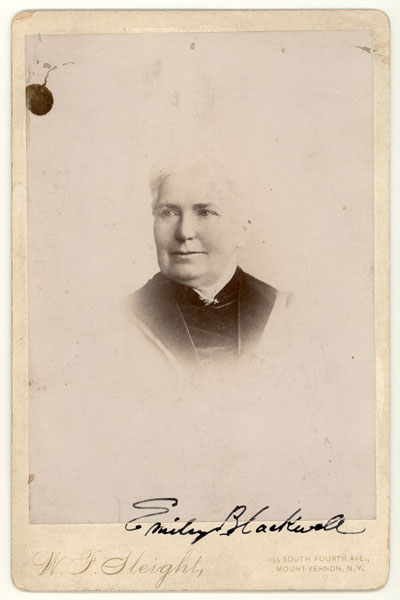Difference between revisions of "Wilson Collection: Emily Blackwell and Elizabeth Cushier"
(Emily Blackwell and Elizabeth Cushier) |
(Emily Blackwell) |
||
| (6 intermediate revisions by the same user not shown) | |||
| Line 1: | Line 1: | ||
[[File:Blackwell.jpg]] | [[File:Blackwell.jpg]] | ||
| − | (Albumen photograph of Dr. Emily Blackwell, circa 1880’s) | + | ''(Albumen photograph of Dr. Emily Blackwell, circa 1880’s)'' |
| − | + | '''Emily Blackwell and Elizabeth Cushier''' | |
| + | |||
| + | In the 1880's, a long-term primary relationship between two single women was called a “Boston marriage.”<ref>Eric Haralson and Kendall Johnson, ''Critical Companion to Henry James: A Literary Reference to His Life and Work'' (New York: Facts on File, Inc., 2009), 68, accessed October 19, 2012, http://books.google.com/books?id=Nrfg5a2Pjs8C&pg=PA68&lpg=PA68&dq=%22one+of+those+friendships+between+women%22+henry+james&source=bl&ots=_srrnjNbJv&sig=qFEiY9Yg8RxEmG9w7yZKG2wQv48&hl=en&sa=X&ei=gQr6T5_uJOXq6wGRqKTABg&ved=0CC8Q6AEwAQ#v=onepage&q=%22one%20of%20those%20friendships%20between%20women%22%20henry%20james&f=false.</ref> At Wellesley College, such committed, romantic companionships were called “Wellesley marriages.”<ref>The History Project, compiler, ''Improper Bostonians'' (Boston: Beacon Press, 1998), 70.</ref> | ||
| + | |||
| + | Doctors Emily Blackwell and Elizabeth Cushier had such a bond. Blackwell co-founded the New York Infirmary for Women and Children (1857) and its Women's Medical College.<ref>Lillian Faderman, ''To Believe in Women: What Lesbians Have Done for America—A History'' (Boston: A Mariner Book, 2000), 278.</ref> Cushier was professor of medicine at the college and Blackwell's life-partner for twenty-eight years. About the relationship, Dr. Cushier wrote, “Thus the years happily passed” until in 1910 “a sad blow came in the death of Dr. Blackwell, making an irreparable beak in my life.”<ref>Faderman, 289.</ref> | ||
| + | |||
| + | ==''References''== | ||
| + | <references/> | ||
| − | |||
| − | |||
| − | + | ==''To return to "Exhibit contents" links, click:''== | |
| − | + | ==[[Rich Wilson: Aspects of Queer Existence in 19th-Century America]]== | |
| − | |||
| − | |||
| − | |||
| − | |||
| − | |||
Latest revision as of 10:57, 26 November 2012
(Albumen photograph of Dr. Emily Blackwell, circa 1880’s)
Emily Blackwell and Elizabeth Cushier
In the 1880's, a long-term primary relationship between two single women was called a “Boston marriage.”[1] At Wellesley College, such committed, romantic companionships were called “Wellesley marriages.”[2]
Doctors Emily Blackwell and Elizabeth Cushier had such a bond. Blackwell co-founded the New York Infirmary for Women and Children (1857) and its Women's Medical College.[3] Cushier was professor of medicine at the college and Blackwell's life-partner for twenty-eight years. About the relationship, Dr. Cushier wrote, “Thus the years happily passed” until in 1910 “a sad blow came in the death of Dr. Blackwell, making an irreparable beak in my life.”[4]
References
- ↑ Eric Haralson and Kendall Johnson, Critical Companion to Henry James: A Literary Reference to His Life and Work (New York: Facts on File, Inc., 2009), 68, accessed October 19, 2012, http://books.google.com/books?id=Nrfg5a2Pjs8C&pg=PA68&lpg=PA68&dq=%22one+of+those+friendships+between+women%22+henry+james&source=bl&ots=_srrnjNbJv&sig=qFEiY9Yg8RxEmG9w7yZKG2wQv48&hl=en&sa=X&ei=gQr6T5_uJOXq6wGRqKTABg&ved=0CC8Q6AEwAQ#v=onepage&q=%22one%20of%20those%20friendships%20between%20women%22%20henry%20james&f=false.
- ↑ The History Project, compiler, Improper Bostonians (Boston: Beacon Press, 1998), 70.
- ↑ Lillian Faderman, To Believe in Women: What Lesbians Have Done for America—A History (Boston: A Mariner Book, 2000), 278.
- ↑ Faderman, 289.
